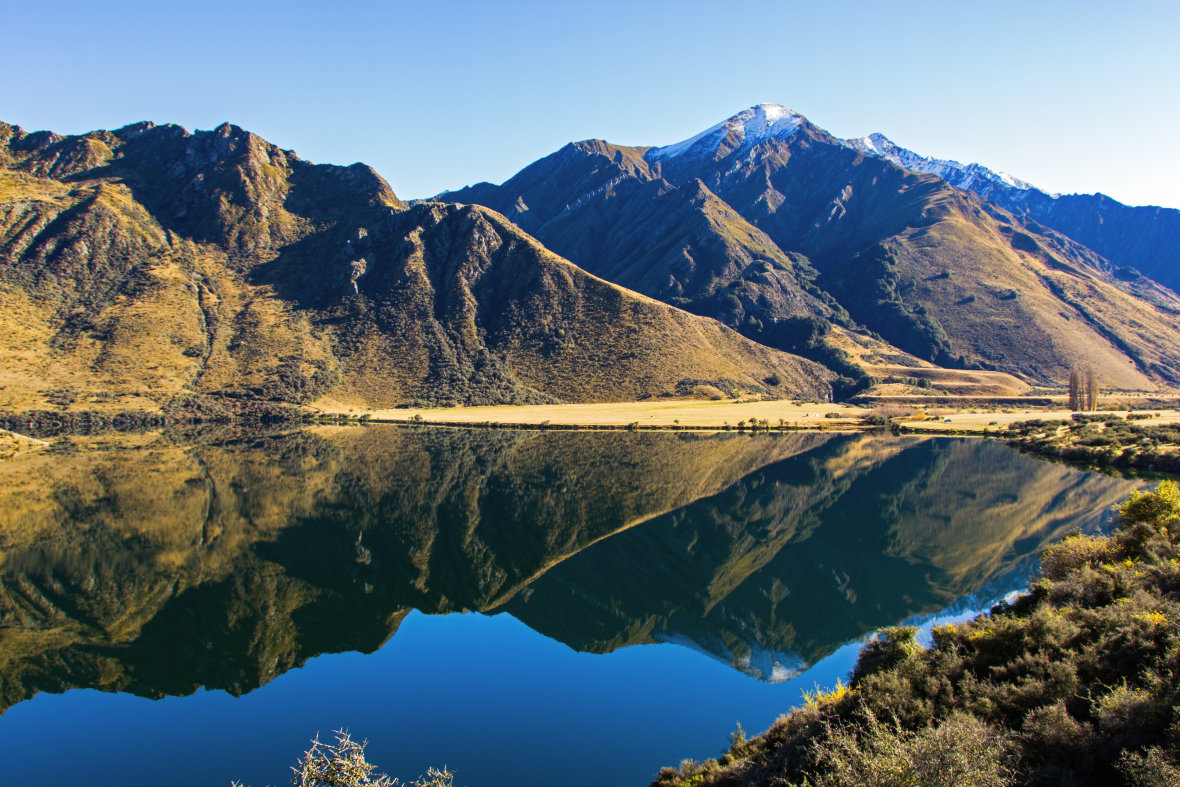How long should I spend at Moke Lake?
Most visitors spend 2–4 hours at Moke Lake, which is enough time to complete the Moke Lake loop track, relax by the water, or enjoy a quiet picnic.
For travellers with more time, staying overnight at the DOC campground allows you to take in the changing light, try some astrophotography, or simply enjoy the peaceful setting after day visitors have left.
Can you swim in Moke Lake?
Yes, swimming is permitted at Moke Lake. The lake’s clear, calm waters are suitable for a short dip, especially during the summer months. After hiking or cycling the loop track, many visitors cool off by wading in from the edge.
That said, it’s important to note that Moke Lake is an alpine lake, so water temperatures can remain cold even on warm days. The best time for swimming is during January and February, when the water has had time to warm and the weather is more stable. As always, be cautious and swim only within your comfort level, especially since the lake is not patrolled.
How to get to Moke Lake
Moke Lake is located around 14.6 km from Queenstown – about a 20-minute drive.
From Queenstown, head west along Glenorchy–Queenstown Road. After roughly 6 km, turn right onto Moke Lake Road. Follow this gravel road for approximately 8 km to reach the lake. The route becomes unsealed after the turn-off and can be narrow in parts, so take care, particularly in winter or after heavy rain.
A 4WD vehicle isn’t required in most conditions, but it's recommended to check with your rental company about suitability for gravel road use. It’s also worth checking the Queenstown Lakes District Council site for any temporary road closures or updates.
Best time to visit Moke Lake
The best time to visit Moke Lake is between November and April, when conditions are most stable and the walking track is dry. During this time, the lake reflects the surrounding peaks and tussock-covered hills, making it especially popular with photographers and walkers.
-
Spring (September–November): Warmer days and wildflowers around the lake.
-
Summer (December–February): Ideal for walking, swimming, kayaking, and camping.
-
Autumn (March–May): Crisp mornings, golden light, and fewer people.
-
Winter (June–August): Cold and often frosty, but offers a dramatic and quiet setting. Access may be limited after snowfall, so check road conditions in advance.
For those looking to experience Moke Lake’s night skies, late summer to early autumn typically offers the best combination of clear skies and comfortable temperatures.

Weather at Moke Lake
The weather at Moke Lake can change quickly due to its alpine setting. Summer brings long daylight hours and mild to warm temperatures, while winter is often cold, with the possibility of frost or snow.
-
Summer (December–February): Daytime highs average around 20–25°C.
-
Autumn (March–May): Cooler and more settled, with highs around 10–18°C.
-
Winter (June–August): Cold and often below freezing overnight. Frost and ice are common.
-
Spring (September–November): Variable, with some warmer days and fresh growth around the lake.
No matter the season, bring layers and be prepared for changing conditions – especially if you’re planning to stay overnight.
Best place to park your campervan at Moke Lake
The best place to park your campervan at Moke Lake is the Department of Conservation (DOC) Moke Lake Campsite, located at the end of Moke Lake Road, directly beside the water.
This first-come, first-served campground has space for around 50 campervans. Facilities include:
-
Non-powered sites
-
Drop toilets
-
Non-treated water (must be boiled before use)
-
A communal cooking shelter
There is no mobile reception at the campsite, and bookings are not required. Fees are $18 NZD per adult, per night, payable via the onsite honesty box (cash only). Due to the unsealed access road and limited facilities, it's best to arrive prepared and allow extra travel time.
Note: Moke Lake is not a designated free camping Queenstown site. Freedom camping is not permitted at the lake itself or along Moke Lake Road. Overnight stays are only allowed within the official DOC campsite, which operates on a paid, self-registration basis.



